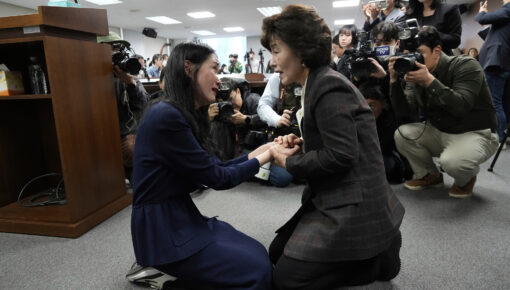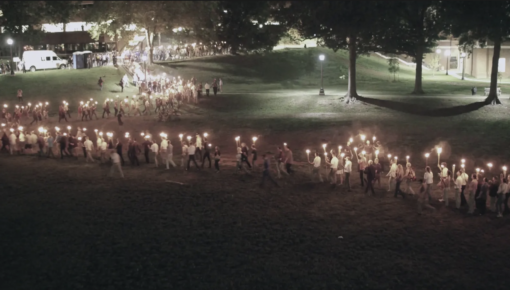The Story of Chinese Muslims Is A “Story That has Global Implications”: Q&A With Filmmakers

The Chinese government has detained an estimated two million Chinese Muslims in camps, which it describes as “vocational education and training” centers, over the last three years. Experts have described it as the largest mass incarceration of an ethnic group since the Holocaust.
FRONTLINE’s latest documentary, China Undercover, features firsthand accounts from people who were held in the camps, and investigates the Communist government’s use of surveillance technology and artificial intelligence to monitor and track Uyghurs and other Muslims outside the camps in the Xinjiang region.
Producers Robin Barnwell and Gesbeen Mohammad describe what’s unfolding in Xinjiang as a new model of governance — “digital authoritarianism” — that is now being exported from China to other countries.
“We are basically seeing, through Xinjiang, a new form of governance being developed to control humans through technology,” Robin told FRONTLINE.
“I think people need to realize that this is not just a local story in Xinjiang, it’s a story that has global implications,” he added. “This is going have serious implications for human rights and democracy around the world.”
Robin and Gesbeen spoke to FRONTLINE about how they made China Undercover, why they decided to capture undercover footage, and what the story of Uyghurs and other Muslims in Xinjiang means for the rest of the world.
What first got you interested in telling this story?
Robin: It was late 2018 when we started this investigation and more information was coming out in terms of the number of people who might have been missing, maybe detained, but still at that stage there wasn’t a huge amount of information, because the Chinese government had stopped information coming out of the region. Obviously, great academics like Adrian Zenz and others were starting to release information based on Chinese government sources, which were online on Chinese websites.
We thought, how can we break new ground on this story thinking not just about those who were detained in the camps, but also about those Uyghurs and other Muslims living outside the camps? When you think of hubs for tech companies in China, you think of Shenzhen, you think of Shanghai, to a degree Beijing. Inexplicably, Urumqi [the capital of] Xinjiang, was one of the tech hubs for Chinese companies developing surveillance technology, and that piqued our curiosity because we thought, “Why are those tech companies there? What are they doing?”
We then traveled on a research trip and started meeting lots of people from the Uyghur community around the world and we chanced upon some new arrivals. A very tiny number of Uyghurs have actually been able to leave Xinjiang. It’s been almost impossible to get any information out. All these relatives abroad of people living in Xinjiang — I’ve never worked on a story in my life where people weren’t able to speak to their relatives. The levels of fear were really palpable. People were terrified of the consequences of calling to speak to their relatives even though they were desperate for information.
Early on in the investigation, we came across this tech engineer who features in the film. We talked to him and we checked out his story. He was not willing to give us too much information at first. He was very nervous. He had family members still in China. But his story added up. As we did more research over the coming months, we started to realize that what he was saying about the surveillance system matched a lot of research coming out from Human Rights Watch. We realized that we were sitting on someone you could call a whistleblower. He’d worked in Xinjiang over more than a decade on surveillance tech, developing it. So we realized that this was a very strong start to our journalism.
Gesbeen: There had been some good reporting done about the camps, but not as much about the surveillance and how technology is assisting the state in repressing the Uyghur Muslims and other Muslims in China. That’s where we thought there was an information gap and how we’d break ground. We were curious about the whole story, but in a way this is the first time it’s been done with technology to that extent on broadcast television. The surveillance aspect is particularly important, because as we try to explain near the end of the film, it’s a governance model that is being exported to other parts of the world.
How did you come to the decision to work with “Li,” the person who filmed undercover for you?
Robin: We were trying to find someone who could safely get into Xinjiang — someone who is Han Chinese, which is the ethnic majority in China. In Xinjiang, Han Chinese make up at least 40 percent or so of the population. But they are treated very differently from local Uyghurs and Kazakh Muslims. So we thought if a Han Chinese went to Xinjiang, he or she would have a better chance of getting people to speak openly about the environment and the situation [while] they’re being secretly filmed — with less likelihood of arousing suspicion.
A Han Chinese person, as we see in the film, is able to move around much more easily through security checkpoints, isn’t stopped and searched in the same way, and he would have access to officials in the government, would have access to companies, and would be trusted to a greater degree than local Uyghurs. If a Han Chinese were caught, the risk to them was obviously going to be much less than if they were a Uyghur or local Muslim. It was quite challenging to find this person. This person is not an activist but somebody who is very much concerned about human rights.
Gesbeen: We did a comprehensive risk assessment, initially. We spoke to a lot of foreign journalists, that had gone to Xinjiang on official press visas. They were being harassed and followed. The authorities would tell them to delete their footage and their reporting was massively restricted. And the Uyghurs these reporters would try to speak to would also face harassment and worse, potentially in the aftermath. It very quickly became apparent that the only way to do proper, independent reporting from Xinjiang was to do it undercover.
What were some of the technical issues and challenges with having someone else film for you inside Xinjiang?
Gesbeen: With any undercover work, your priority is that they do their job safely but also that you get material back that you can use and make a film out of — otherwise the risk is for nothing. In Thailand, we trained “Li” to encrypt his rushes on a laptop, and we also did a bit of camera training with him. Of course, we also discussed the investigation and the elements to focus on in Xinjiang as well as the security protocols, so it was quite a challenging week for everyone. But obviously once he was in Xinjiang, we had no control over anything, because without putting him at risk of being detected, we weren’t able to contact him about the film-making process.
At what point did you find out about the incredible footage that had been captured, including the interview with people at Leon tech?
Robin: We met up with “Li” after he left Xinjiang. We spent about a week with “Li” going through in minute detail everything that he’d done, who he’d seen, who he’d met, checking who these people were, and cross-referencing to make sure they were who they said they were. We then went through the footage with him in great detail to get a picture of everything he’d gathered.
There were two bits of footage that stood out. One was his meeting with the security official, basically a local government official in Xinjiang. Clearly the meeting with him was quite revealing, because this official was saying, certainly for the first time I’ve heard on camera, that Uyghurs have no human rights. And that the policy, in the official’s view, was excessive.
And then, what was even more revealing was footage from inside one of the companies that is a key actor, helping the authorities in Xinjiang build the surveillance system, the Integrated Joint Operations Platform.“Li” had been able to visit the company, Leon Technology. [Him] being a Han Chinese businessman, they were relaxed around him and they were keen to boast about their capabilities. He was able to ask naïve questions and they gave quite bold answers. If you’d been a Western journalist or somebody from another part of the world, you wouldn’t have necessarily gotten those sorts of answers.
Gesbeen: We were really surprised when we saw he’d got the interview with Leon and the official. Especially with Leon, there had been bits of information about what technology companies were behind the surveillance system being built in Xinjiang, but that meeting, alongside all this background evidence that we had, confirmed that they were one of the key companies assisting the state in building the Integrated Joint Operations Platform. And having that footage is of great public interest and global significance.

The bar codes on doors of Uyghur homes was a jaw-dropping detail for me. For people who haven’t been following this issue closely, can you describe what you found while reporting about the level of state surveillance China’s Uyghur population was under?
Robin: In the 21st century, Chinese authorities are able to bring together traditional methods of gathering information, like Han Chinese going into Uyghurs’ homes to gather information, with high-end tech, like voice recognition, iris scans, fingerprints. You’re not just relying on information from informants, but you’re also feeding these vast amounts of data into computer systems. Every Uyghur and Muslim in Xinjiang has to install this special app on their phone, which then monitors how you use your cellphone. Bar codes on people’s houses are able to tell the authorities who’s supposed to be in that house. There are travel restrictions on Uyghurs and other Muslims moving around Xinjiang. So, if you’re not authorized to go to a city, or if you’re moving from the countryside to the city, you will be stopped and questioned. Going through all of these checkpoints allows the authorities to keep track of you. Even going into your district, you’d have to swipe your ID card.
They’ve got tabs on you wherever you go and as we’ve been told by Uyghurs and other Muslims who’ve been through the system, wherever you go, you’re assessed and there’s a certain coding. You’re either regarded as a “safe” person, “of concern” or “dangerous,” when you swipe your ID card at these security checkpoints. Bear in mind, there are also cameras, sometimes equipped with facial recognition, following you, checking your every move outside of the checkpoints. Then you go home, and you may find that you have a Han Chinese person living with you, or coming to visit you, inputting other information about you such as whether you read the Koran, how you dress, whether you’re interested in alcohol or you’re religious.
Gesbeen: I think one of the concerning things about this surveillance police state is the behaviors that they look out for. The things that we deem absolutely normal, such as having WhatsApp on your phone, never mind religion. These normal behaviors can be deemed suspicious and flag you up in the system. Even things like turning your phone off is suspicious, because then they’re not able to monitor your phone. It’s impossible to even try to go off the surveillance radar for the evening, as it might lead to you being detained. It’s sort of a place where there’s no room to breathe or behave in ways that are natural.
Robin: Uyghurs told us that as a result, they not only change their behavior, they censor themselves in various ways. They wouldn’t go to the mosque, they wouldn’t pray or have their Koran on display at home. In this environment, they’d change their behavior to start eating non-Halal food and they might drink [alcohol] in order to reduce suspicion. When they’re going through these security checkpoints, they would want to play the system to enable them to live a “normal” life, to the limited degree that is possible. They end up wanting the technology to give them the green light, leading to behavior modification and self-censorship.
What are you hoping viewers take away from watching this documentary?
Robin: I’m always amazed at how few people still know about this story. Journalists have been trying their best to get it out there. The idea that in the 21st century, there are around two million people who’ve been locked up and that there’s a part of the world where 13 million people from an ethnic group and religious group, Muslims in this case, are actually unable essentially to contact the outside world.
It tells you quite a lot about China under President Xi Jinping. People talk about the 21st century as being China’s century, and it’s obviously a very important global economic power, but there are huge concerns about the Communist regime’s human rights abuses.
I’d like people to take away the idea of digital authoritarianism — the idea that there’s this model of governance which is going to be a massive force in the 21st century. We are basically seeing, through Xinjiang, a new form of governance being developed to control humans through technology, which is already being exported around the world, enabling authoritarian governments to control their citizens to a terrifying degree. The central ideological battle of this century will be China’s model of authoritarianism versus the West’s increasingly shaky liberal democracy. I think people need to realize that this is not just a local story in Xinjiang, it’s a story that has global implications. This is going have serious implications for human rights and democracy around the world.





